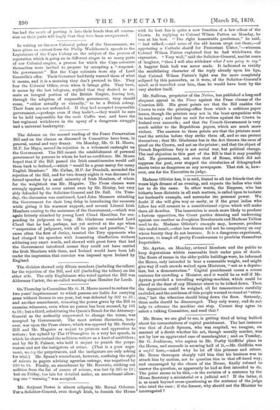The debates on the second reading of the Peace Preservation
Bill and on the clauses as discussed in Committee have been, in general, unreal and very dreary. On Monday, Mr. G. H. Moore, M.P. for Mayo, moved its rejection in a vehement onslaught on the Government. The Bill meant the establishmeut of personal government by persons in whom he had no confidence. Mr. Moore hoped that if the Bill passed the Irish constituencies would call them back to Ireland,—which "would be a great mercy for many English Members." Mr. Callan, M.P. for Dundalk, seconded the rejection of the Bill, and for two dreary nights it was discussed in forced speeches by a small minority of Irish Members, of whom far the weightiest was Mr. Maguire. The Press clauses were strongly opposed, to some extent even by Mr. Henley, but very ably defended by the Solicitor-General and Dr. Ball. On Tues- day, the discussion was continued, Lord John Manners attacking the Government for their long delay in introducing the measure while giving it his warmest support, and several Liberal Irish Members coming to the assistance of the Government,—which was again bitterly attacked by young Lord Claud Hamilton for sus- pending its judgment so long. Mr. Gladstone reminded Lord Claud that he had, perhaps, not yet arrived at the age when "suspension of judgment, with all its pains and penalties," be- came often the first of duties, taunted the Tory opponents who had charged his speeches with fomenting disaffection without adducing any exact words, and showed with great force that had the Government interfered sooner they could not have carried the Irish Members with them, and Ireland would have been left under the impression that coercion was imposed upon Ireland by England.


































 Previous page
Previous page